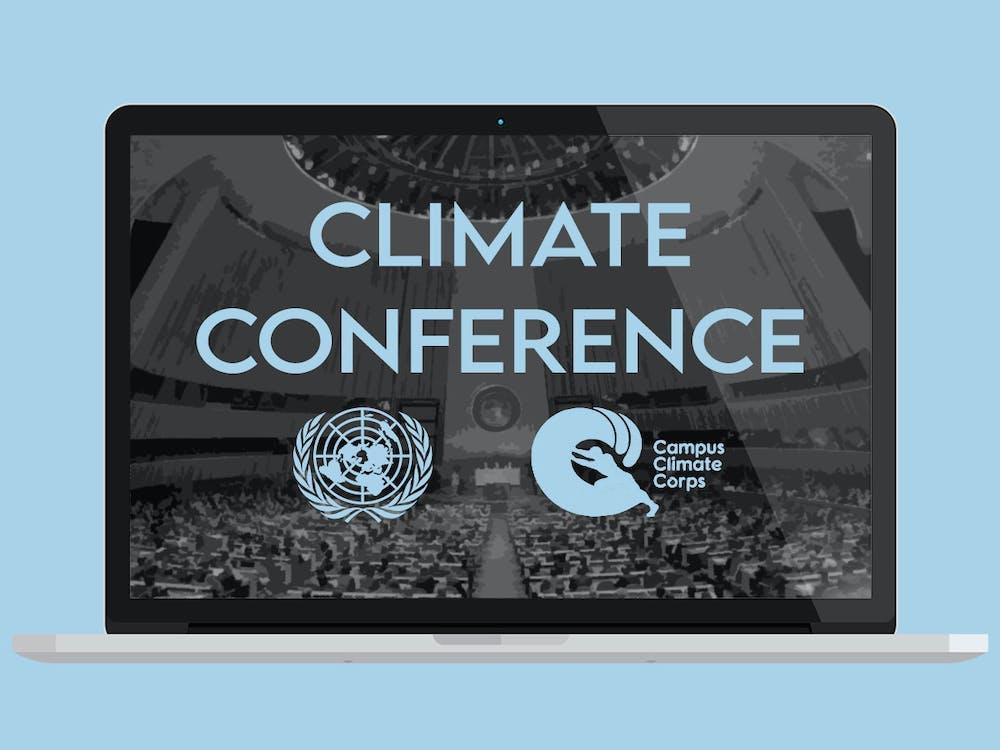Two weeks ago, nations, corporations, scientists, activists and fossil fuel representatives gathered in Sharm El Sheikh, Egypt, to discuss the existential threat of climate change. Its climate talks were finalized Nov. 20.
But many, including some at UF like Esteban Rodofili, a 31-year-old UF interdisciplinary ecology graduate student, and Valholly Frank, a 19-year-old UF undergraduate student and Seminole activist, are disappointed.
“While I am pleased to see some progress on loss and damage, I am concerned that many of the important aspects to bring it to fruition remain to be discussed in the future,” Rodofili said. “What also concerns me is the lack of progress on decarbonization, which is urgently needed to protect us all from the worse effects of climate change.”
Campus Climate Corps, a joint effort of student volunteers to help address climate change, held weekly briefings breaking down what occurred during COP27. The event was hosted by Rock Aboujaoude, a UF graduate student, and had presentations by UF faculty, students and scientists.
COP stands for Conference of Parties, referring to the 197 nations — -or parties —- that ratified the treaty addressing climate change during the United Nations Framework Convention on Climate Change in 1992.
When Aboujaoude was 19, he attended COP23 in Bonn, Germany. There, he met a group of teenagers from a Pacific island that had gone underwater due to rising seas. The Fiji government could no longer spare the funds to keep their island above water, so they had to move to Japan.
“That stood out to me as one of the most powerful statements I've ever heard in my life,” Aboujaoude said. “I shook the hand of this young kid and said, I'm sorry, for what you know, I'm sorry for what's happening to you. I'm going to do everything I can on my end to help you from across the world.”
Rodofili and Frank attended COP27 as CCC representatives. They debriefed the organizations via Zoom to discuss what they saw daily.
The first thing they noticed was the drastic drop in demonstrations when compared to last year’s COP, Rodofili said, and the summit also had a strong police presence.
“The only protests that we see there are when you walk in and it's the vegans chanting and singing weird songs,” Frank added. “It's a little strange.”
One of the biggest talking points expected at COP27 was a discussion surrounding “loss and damage” or how developed countries would finance developing nations facing the worst effects of climate change. The final agreement, which extended the two-week conference by two days, doesn’t specify which countries will contribute.
Developing nations will have to wait until COP28 next year to discuss how the new fund will operate, according to a UN Climate press release.
Issues with the event’s sponsor was another concern of activists. COP27 was sponsored by Coca-Cola, the world’s top plastic polluter for the fifth consecutive year, according to Break Free From Plastic’s 2022 Brand Audit report.
Generally, these summits have been nationally recognized as yearly failures by scientists, activists and politicians. At last year's summit, held in Glasgow, Scotland, 503 delegates represented the fossil fuel industry. This year, that number increased to around 636.
The content discussed during COP27 was lacking in solutions while stressing just how complex the situation is, Rodofili said. These complexities aren’t new, however.
“It's not solution-oriented enough for anybody to explain how they're going to do anything,” Frank said.
During CCC’s first live meeting, Stephen Mulkey, a climate scientist and UF climate change lecturer, raised concerns about the location of this year’s COP in Egypt.
He pointed to the Egyptian government's silencing of dissidents, limiting conference access to activists and hiring a firm that participates in greenwashing — the act of misleading the public regarding environmental practices to make a company, organization or product seem more sustainable than they really are.
“If we don't come out of COP27 with huge ambition, without something way beyond incremental change, then COP27 will have been a failure,” he said.
In his presentation, Mulkey also discussed the idea of degrowth, which the IPCC AR6 report urges countries to employ as a solution to the climate crisis. Degrowth rejects the idea that economic growth is necessary and instead proposes an economic structure that puts ecological wellbeing first.
“This means rapidly ending neoliberal capitalism based on extraction and exploitation,” Mulkey said.
COP27 did shed some much needed light on carbon accounting — the method through which countries track their emissions — and transparency, Frank said. At the summit, she attended a talk by Al Gore, the former U.S. vice president, where he discussed a new project known as Climate TRACE.
This new technology tracks greenhouse gas emissions by using more than 300 satellites, 11,000 sensors and artificial intelligence. An international carbon accounting standard was currently lacking, which Climate TRACE works to remedy.
Frank is also hopeful about a new initiative in the South Pacific Ocean nation of Vanuatu seeking an advisory opinion from the International Court of Justice, she said, which would put human rights at the center of climate change discussions.
In 2018, Frank filed a lawsuit alongside seven other Floridians, all 19 and younger, against the state of Florida for violating their rights to a stable climate system and for failing to project public trust resources, which is codified in the Florida Constitution. The case was dismissed in 2020.
An ICJ advisory opinion would hold nations accountable and clarify their obligation to protect their citizens from climate change under international law, Frank said.
Alongside the European Parliament, the World Health Organization and Tuvalu, Vanuatu is one of the national governments and corporations that have signed onto the Fossil Fuel Non-Proliferation Treaty, which seeks an equitable transition toward renewable sources of energy.
“The United States can bully small countries and countries in the Global South, but they can't bully countries like Germany,” Frank said.
This means the U.S. will have a difficult time trying to prevent the treaty, Frank added.
But COP27 ended on a less committed note than many would have liked. They released their final decision’s second draft Friday, which fails to commit to phasing out all fossil fuels. The draft still attempts to stay under 1.5 degrees of warming.
Current projections have global temperatures peaking between 2.1 and 2.9 degrees Celsius by 2100, according to a recent report by the United Nations. Global temperatures within this range would mean up to 3 billion people experiencing chronic water scarcity due to droughts.
Despite the stark statistics, which paint an increasingly bleak future as countries continue to not deliver on their promises, 19-year-old Ava Vellines has never experienced nihilism toward the cause.
“It's actually crazy to me that you can be aware of climate change and not feel that motivation,” the sustainability studies freshman said.
But sometimes she questions why she keeps going. She’s considered tapping out and picking her own little corner of the world to enjoy what she has while she has it, she said.
Those are the low days, but she said the inability to fully conceptualize the threat climate change poses on human existence can be advantageous when fighting it.
“I almost feel like ignoring the worst scenarios makes it a little bit possible even though you're preparing for the worst scenario,” she said.
Contact Fernando at ffigueroa@alligator.org Follow him on Twitter @fernfigue.
Fern is a junior journalism and sustainability studies major. He previously reported for the University and Metro desks. Now, he covers the environmental beat on the Enterprise desk. When he's not reporting, you can find him dancing to house music at Barcade or taking photos on his Olympus.






